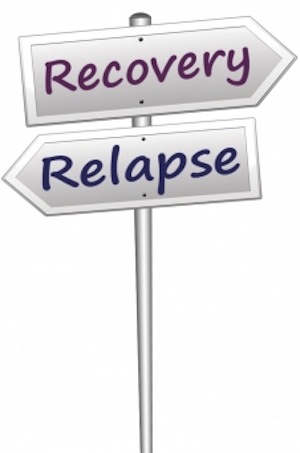What An Eating Disorder Relapse Can Teach You

Facing an eating disorder relapse, I’m settling into my first full day of inpatient eating disorder treatment. So in case my beating around the bush in previous posts didn’t make it clear: I’ve relapsed back into my eating disorder. I wish I could say this was uncommon. It’s not – estimates for relapse in the first year after eating disorder treatment are nearly 50%. I’ve been bouncing in and out of treatment for three years now; I have met women who have been doing so for ten years or more.
And while I could go into a long diatribe about how the eating disorder relapse rate might be lower if insurance companies covered treatment earlier in the disorder (oh wait – I’ve already done that), instead I want you to consider something. Maybe a little relapse can be good for your eating disorder recovery.
Learning From Eating Disorder Relapse
Hold on – before you bring out the pitchforks and the angry mob, let me state that I’m certainly not advocating eating disorder relapse. However, if you catch it early enough and intervene quickly and effectively, relapse can teach you a lot about your eating disorder and a lot about what you need to successfully recover.
Catching it “early enough” isn’t really determined by your weight or frequency of behaviors or anything else. My weight is the lowest it has ever been, but my heart and mind are still yearning for recovery. I am nowhere near the place I was last year: depressed, suicidal, and in utter denial about my anorexia relapse. If I were in that place, I would be far past the point that I would be able to put this experience to good use.
But since I am still in the game mentally, I have an excellent opportunity. I can take my time in treatment to not only restore myself physically, but I can patch up the holes in my recovery. I can take a hard look at what has worked over the past year and what hasn’t – what to keep in my recovery plan and what to scrap.
How To Learn From Your Relapse
 Everybody’s plan of recovery has weaknesses – if they didn’t, eating disorder treatment centers would see far fewer readmissions. So if you’ve relapsed, especially if you had a few months (or longer) of a strong recovery, you’ve got plenty of data to help you figure out what you need to change.
Everybody’s plan of recovery has weaknesses – if they didn’t, eating disorder treatment centers would see far fewer readmissions. So if you’ve relapsed, especially if you had a few months (or longer) of a strong recovery, you’ve got plenty of data to help you figure out what you need to change.
Triggers: Is there something that triggered your eating disorder relapse? This could be as monumental as a traumatic experience or something as seemingly inane as going for a run. For my part, exercise is a huge trigger for me. It has always been a strong part of my eating disorder and so being allowed to exercise as soon as I got home created a very slippery slope. Now I know.
My dietitian and I have begun to have the conversation about what exercise will look like for me when I return home. If there was a trigger, you now have an opportunity to build up your resources around that: can you avoid that trigger (such as the gym or a certain part of campus or whatever) and if not, how can you deal with it better in the future?
Build an Eating Disorder Recovery Support System.
It’s the rare person that can go through recovery from an eating disorder with nothing more than a dietitian and therapist. We truly need friends and family who are there to support us, there to help us through rough patches, there to encourage us on the rough days that inevitably come in recovery (Learn how to support someone with anorexia). For my part, I’m absolutely rubbish at making use of all the friends, family, and spiritual brothers and sisters who are willing to walk through this with me. A lot of my time in treatment is going to be devoted to A) accepting that I need people’s help and B) figuring out how to ask for (and receive) that help.
Use self-correction after an eating disorder recovery slip.
Somewhere in recovery, we are all going to slip. It’s bound to happen. The real question is, what are you going to do after you slip? Last time, when I left treatment, I had all these great plans for self-correcting if I restricted or over-exercised or purged. And if I’d put them into practice, I could have stayed in recovery with no problems. But my self-corrections were a little, shall we say, ambitious. The chances of me telling my treatment team, supplementing, and laying off exercise for the next 24 hours in the event that I restrict a meal or snack? Slim.
When I rewrite my recovery plan at the end of treatment this time, my self-corrections are going to be far more realistic. The reality is that just telling my treatment team and someone in my support system is a huge step. That one step alone sends the message to my eating disorder that I am in control. It also means that other people are watching for patterns that I may not see.
If you have relapsed in the past, what are some lessons you’ve learned to make your recovery stronger in the future?
APA Reference
Hudgens, J.
(2013, April 11). What An Eating Disorder Relapse Can Teach You, HealthyPlace. Retrieved
on 2025, December 8 from https://www.healthyplace.com/blogs/survivinged/2013/04/what-a-relapse-can-teach-you-about-your-eating-disorder-recovery
Author: Jessica Hudgens
Thanks for sharing how things are going for you. I really admire your courage and being up front about relapsing and then writing about it here.
I wish you all the best. You're gonna make it.